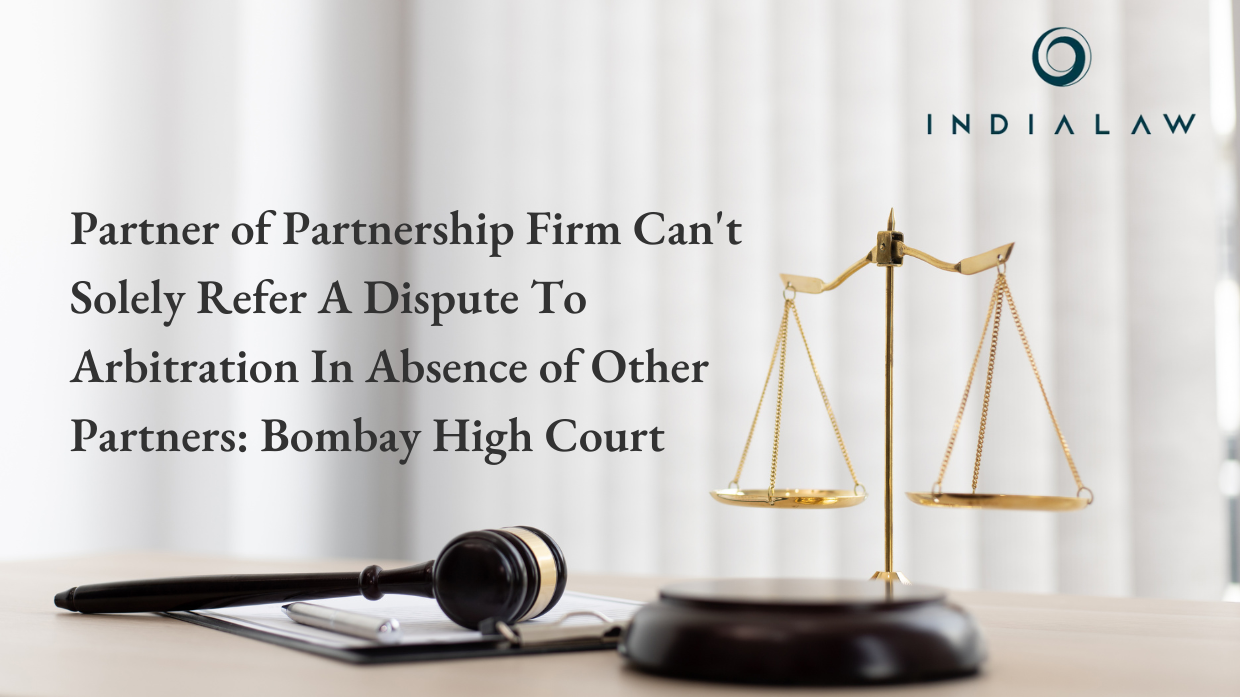Partner of Partnership Firm Can’t Solely Refer A Dispute To Arbitration In Absence of Other Partners: Bombay High Court

The High Court of Bombay (HC) in Shailesh Ranka and Ors. v. Windsor Machines Limited & Ors.[i] held that a firm’s partner cannot solely decide and initiate arbitration proceedings without the consent of the other partners.
The Bench of Justice Manish Pitale highlighted that the implied authority bestowed on the partners cannot be invoked considering the bar provided under Section 19(2)(a) of the Partnership Act, 1932 (Act), to refer a business-related dispute to Arbitration without the consent of the remaining partners. This provision specifies that unless there is an agreement between the parties in contrast, a partner under his implied authority cannot refer a dispute to arbitration.
Facts of the case
Shailesh Ranka and Ors. (applicants) and respondent no.2, were the partners of R-Cube Energy Storage Systems LLP (R-Cube Energy). They had entered into an investment agreement with Windsor Machines Limited (respondent no.1). As per the agreement, the respondent No.1 had to invest Rs.16.5 crores towards development of technology obtained by R-Cube Energy from Fraunhofer Institute for Ceramic Technologies and Systems (Fraunhofer Institute). That the initial amount was invested by respondent No.1 and it defaulted subsequently.
The applicants had to face market embarrassments and the threat of legal action from Fraunhofer Institute. This led to a dispute between the applicants and respondent no.1. The applicants made attempts to communicate with respondent no.1. Consequently, the applicants appointed a neutral person in accordance with clause 24 of the investment agreement and asked respondent no.1 to appoint its neutral person for conducting dispute resolution meetings. However, respondent no.1 failed to do so and hence, the applicants sent a notice invoking arbitration proceedings.
Objections of Respondent No. 1
- The notice invoking the arbitration was issued only on behalf of the applicants, excluding another partner i.e. respondent no.2, and hence the dispute resolution mechanism had not been properly activated.
- It was specifically mentioned in the investment agreement that pre-arbitration steps to be taken by referring the dispute to neutral persons for amicable settlement before invoking arbitration, which was not fulfilled.
Analysis by the High Court
Clause 24 of the agreement pertaining to dispute resolution the Court elaborated that a two-tier procedure was prescribed for resolution of dispute:
- Firstly, by referring the dispute to neutral persons, one each to be appointed by the parties;
- On failure of this procedure, secondly, arbitration proceedings could be invoked through issuing a written notice.
While considering the first objection of respondent no.1, regarding the exhaustion of the dispute resolution mechanism. The HC stated that the applicants had appointed a neutral person and communicated the same to respondent no.1. However, respondent no. 1 failed to appoint its neutral person and hence, it cannot claim the non-exhaustion of the prescribed process.
On the second objection of respondent no.1, the HC observed that the notice of arbitration was issued by the applicants on behalf of the firm, but the other partner’s (respondent no.2) consent was not obtained. An arbitration notice issued by one of the partners without other partners’ consent is invalid hence it rendered the application appointing the arbitrator also invalid.
The Court clarified that business-related dispute of a partnership firm cannot be referred to arbitration solely by one partner, in absence of the other partners’ consent. The partner’s implied authority does not extend to refer the dispute to arbitration as per Section 19(2)(a) of the Act.
It added that “A bare reading of Section 19(2)(a) of the Partnership Act shows that implied authority of a partner in a partnership firm does not empower such a partner to submit a dispute relating to the business of the firm, to arbitration. In other words, one set of partners cannot submit a dispute relating to business of the partnership firm to arbitration, in the absence of the other partners joining them.”
On the above findings, the HC dismissed the Section 11 application filed under the Arbitration Act, highlighting that a defective notice could not give rise to a cause of action.
The Court clarified that implied authority bestowed on the partners under the Partnership Act cannot be invoked to refer a dispute to the Arbitration in absence of the remaining partners.
[i] (L) No. 38198 of 2022
By entering the email address you agree to our Privacy Policy.



